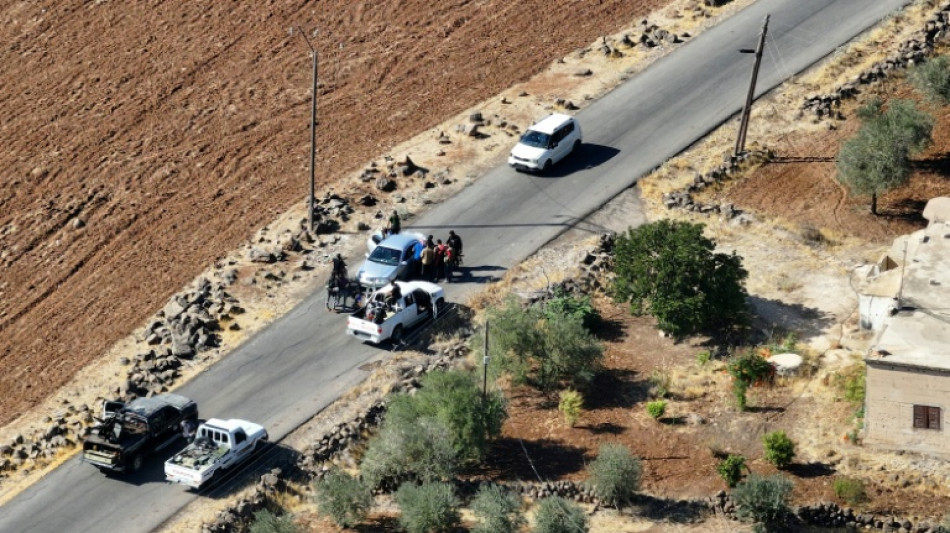
RBGPF
0.0000

Syrian troops pulled out of the Druze heartland province of Sweida Thursday on orders from the Islamist-led government, leaving bodies strewn on the street, AFP journalists reported from the provincial capital.
The southern province has been gripped by deadly sectarian bloodshed since Sunday, with hundreds reportedly killed in clashes pitting Druze fighters against Sunni Bedouin tribes and the army and its allies.
In a televised speech, Islamist interim President Ahmed al-Sharaa said community leaders would resume control over security in Sweida after the deployment of government troops on Tuesday fuelled the sectarian bloodshed and prompted Israeli military intervention.
Government troops told AFP that the order to withdraw came shortly before midnight (2100 GMT Wednesday) and they completed their pullout from the province at dawn.
An AFP photographer counted 15 bodies on the street in the centre of Sweida on Thursday after government forces pulled out.
The Syrian Observatory for Human Rights has said more than 370 people have been killed in sectarian clashes in the city since Sunday.
Israel had pounded government troops with air strikes during their brief deployment to the southern province and also struck army headquarters in Damascus, warning that its strikes would intensify until the Islamist-led government pulled back.
Sharaa announced in a televised address that "responsibility" for security in Sweida would be returned to community leaders "based on the supreme national interest".
- Promise of 'protection' -
Sharaa, whose Islamist-led interim government has had troubled relations with ethnic and religious minority groups since it toppled veteran leader Bashar al-Assad in December, also pledged to protect the Druze.
"We are keen on holding accountable those who transgressed and abused our Druze people, as they are under the protection and responsibility of the state," he said.
March saw massacres of more than 1,700 mostly Alawite civilians in their hub on the Mediterranean coast, with government-affiliated groups blamed for most of the killings.
Government forces also battled Druze fighters in Sweida province and near Damascus in April and May, leaving more than 100 people dead.
Government troops had entered Sweida on Tuesday with the stated aim of overseeing a truce, following days of deadly sectarian clashes.
But witnesses said government forces had instead joined the Bedouin in attacking Druze fighters and civilians.
Addressing the Druze, Sharaa attempted to reassure the minority community, vowing that "protecting your rights and freedom is one of our priorities".
- US mediation -
He hit out at Israel's military intervention which saw it strike army headquarters in Damascus on Wednesday after repeated strikes on Syrian government troops during their brief deployment in Sweida.
But the Syrian leader, who met briefly with US President Donald Trump in Saudi Arabia earlier this year, also thanked Washington for its role in brokering a diplomatic solution.
"The Israeli entity resorted to a wide-scale targeting of civilian and government facilities," that would have pushed "matters to a large-scale escalation, except for the effective intervention of American, Arab, and Turkish mediation, which saved the region from an unknown fate", Sharaa said.
The United States -- a close ally of Israel that has been trying to reboot its relationship with Syria -- said an agreement had been reached to restore calm in the area, urging "all parties to deliver on the commitments they have made".
Secretary of State Marco Rubio said all sides had "agreed on specific steps that will bring this troubling and horrifying situation to an end".
"This will require all parties to deliver on the commitments they have made and this is what we fully expect them to do," he posted on X.
Israel, which has its own Druze community, has presented itself as a defender of the Syrian minority, although some analysts say that is a pretext for pursuing its own military goal of keeping Syrian government forces as far away as possible from the Israeli-occupied Golan Heights.
Israel, which is home to around 150,000 Druze citizens, has repeatedly stated its intention to defend Syria's Druze community.
The Israeli military, which has taken control of the UN-monitored demilitarised zone on the Golan Heights and conducted hundreds of strikes on military targets in Syria, also says it will not allow any Syrian military presence in the south.
Despite having initiated contact with a first face-to-face meeting in Azerbaijan earlier this month, Israel remains extremely wary of Syria's new rulers, including Sharaa whose Hayat Tahrir al-Sham movement was once linked to Al-Qaeda.
burs-kir/ysm
R.Rous--TPP